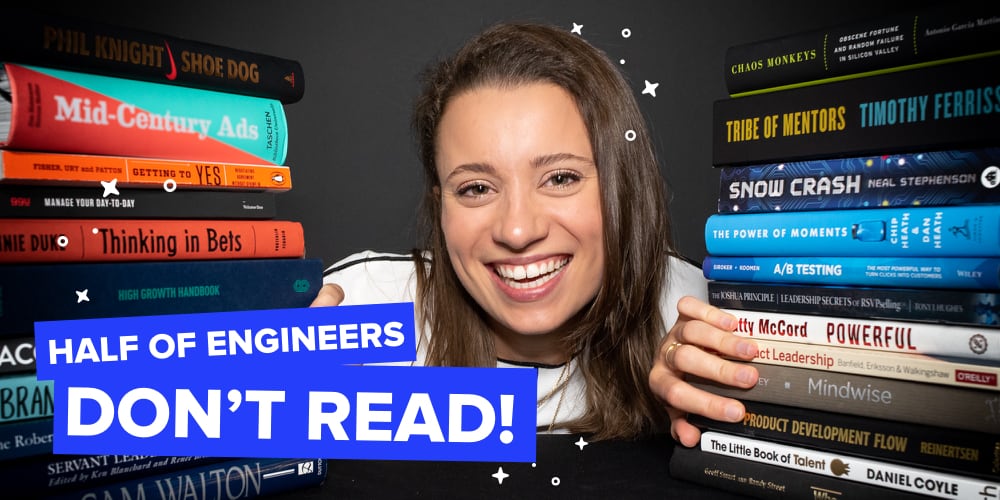
Here’s the thing: you should be reading. A lot. Especially if you’re a technical lead or trying to level up your engineering role.
It’s easy to focus only on the daily grind. After all, software engineering is a challenging job, and you worked hard to get to where you are. You’re basing your day-to-day work on everything you’ve learned over your career.
This isn’t a bad thing.
If you’re lucky, you have a great technical mentor who sometimes drops wisdom on you, but they’re not always available. You’ve only learned from your work, little by little, every day.
Your implementations are limited to your personal experience and observations.
This approach may sustain your career, but we want to accelerate it.
The cheapest way to learn
If you want to push down on the gas, you have to short-circuit the trial and error process that we all go through. After all, you can’t live 100 lifetimes with 100 careers. We have to leverage the learnings of others to get ahead.
This is where reading really shines.
To get the best results, use books to discover the habits of already successful people. The goal is to make the steps to success more clear. You can do this by expanding the collection of ideas and actions you use to make decisions.
A simpler way to say it might be “if you try to solve problems the way successful people have, you may find success”.
Stand out from the crowd
Before writing this, I asked myself “how many engineers read books?”. A lot of us learn by tinkering or through short articles. I posted a survey to Twitter to gather some information about yearly reading habits.
? Software friends! how much do you read (books) about our craft, startups, leadership, sales, marketing, etc every year? ?
⚠️ this would include books about sales, but not say, gardening
?? Please choose the answer that most closely describes your experience!
— Pete Karl II ? (@steyblind) August 13, 2018
As it turns out, just under half of the 2,250 engineers who responded don’t read many books, or don’t read books at all.
About a third of them, 700 engineers, said they read just a few books yearly.
Less than a sixth of them, about 330 engineers, read more than 10 books a year.
Based on the discussion that followed, I have a couple of theories:
- Individual Contributors focus more on experimentation and cutting edge technical articles than on classic materials about systems and the business of programming
- Once someone makes the jump to leadership in any capacity (whether they’re managing engineers or growing into a staff/principal engineering role), they need to gain a lot of knowledge very quickly
- If you’re an individual contributor, you have an opportunity to stand out from other ICs by developing a reading habit.
Here’s how it works:
If you want to give this a try, here’s how you can add “reading” to your professional repertoire.
- Find a book that inspires someone who’s at the next level (if you’re a senior engineer, talk to tech leads. If you’re a tech lead, talk to a director, and so on).
- As you read, think about your daily work in the framing of the book. Take this opportunity to get lost in the situations the author is describing.
- Give yourself 2 weeks to learn something from the book.
The goal SHOULD NOT be to read it cover to cover.
As soon as you find something that could help you at work, give it a try!
Here’s an example from my own career.
I was a tech lead, and I was reading Turn the Ship Around. The book tells the story of a submarine captain who improved the performance of his crew. They had no margin for error.
I wanted to find ways to improve performance in a fast-paced engineering environment, so I dug in!
About a third of the way into the book, the author highlights a change he made in the way his crew addressed him. He insisted the crew tell him what they intend to do, rather than asking permission to perform an action.
This was a subtle, but powerful, concept. A way to put ownership where it belonged (in the hands of the people closest to the problem). I immediately put this lesson to work for me, and I’ve considered it a great learning.
I’ve put many (hundreds) of small learnings like this into action. Over the years, I’ve become a better technologist, a better team leader, and a better mentor. If that’s not a recipe for standing out, then I don’t know what is!
Final thought
If you’re unconvinced, look for the books that everyone references, and read some reviews. There’s a reason why the classics are classics! Look for a single takeaway from each book that you can put into action now.
Here are a few to get you started:
Are you already a reader? I’m always looking for recommendations to share with the team! Find me on Twitter at @steyblind and tell us what we should read!



